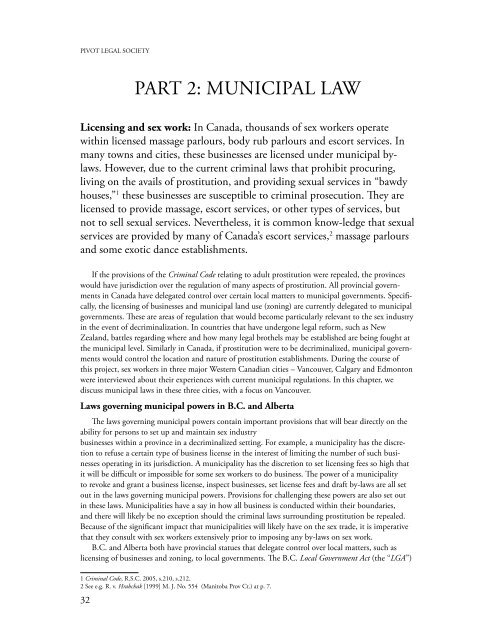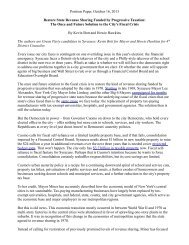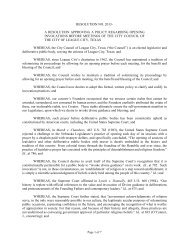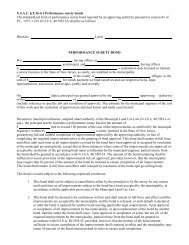Beyond Decriminalization: Sex-work, Human Rights and a New ...
Beyond Decriminalization: Sex-work, Human Rights and a New ...
Beyond Decriminalization: Sex-work, Human Rights and a New ...
- No tags were found...
Create successful ePaper yourself
Turn your PDF publications into a flip-book with our unique Google optimized e-Paper software.
PIVOT LEGAL SOCIETYPART 2: Municipal LawLicensing <strong>and</strong> sex <strong>work</strong>: In Canada, thous<strong>and</strong>s of sex <strong>work</strong>ers operatewithin licensed massage parlours, body rub parlours <strong>and</strong> escort services. Inmany towns <strong>and</strong> cities, these businesses are licensed under municipal bylaws.However, due to the current criminal laws that prohibit procuring,living on the avails of prostitution, <strong>and</strong> providing sexual services in “bawdyhouses,” these businesses are susceptible to criminal prosecution. They arelicensed to provide massage, escort services, or other types of services, butnot to sell sexual services. Nevertheless, it is common know-ledge that sexualservices are provided by many of Canada’s escort services, massage parlours<strong>and</strong> some exotic dance establishments.If the provisions of the Criminal Code relating to adult prostitution were repealed, the provinceswould have jurisdiction over the regulation of many aspects of prostitution. All provincial governmentsin Canada have delegated control over certain local matters to municipal governments. Specifically,the licensing of businesses <strong>and</strong> municipal l<strong>and</strong> use (zoning) are currently delegated to municipalgovernments. These are areas of regulation that would become particularly relevant to the sex industryin the event of decriminalization. In countries that have undergone legal reform, such as <strong>New</strong>Zeal<strong>and</strong>, battles regarding where <strong>and</strong> how many legal brothels may be established are being fought atthe municipal level. Similarly in Canada, if prostitution were to be decriminalized, municipal governmentswould control the location <strong>and</strong> nature of prostitution establishments. During the course ofthis project, sex <strong>work</strong>ers in three major Western Canadian cities – Vancouver, Calgary <strong>and</strong> Edmontonwere interviewed about their experiences with current municipal regulations. In this chapter, wediscuss municipal laws in these three cities, with a focus on Vancouver.Laws governing municipal powers in B.C. <strong>and</strong> AlbertaThe laws governing municipal powers contain important provisions that will bear directly on theability for persons to set up <strong>and</strong> maintain sex industrybusinesses within a province in a decriminalized setting. For example, a municipality has the discretionto refuse a certain type of business license in the interest of limiting the number of such businessesoperating in its jurisdiction. A municipality has the discretion to set licensing fees so high thatit will be difficult or impossible for some sex <strong>work</strong>ers to do business. The power of a municipalityto revoke <strong>and</strong> grant a business license, inspect businesses, set license fees <strong>and</strong> draft by-laws are all setout in the laws governing municipal powers. Provisions for challenging these powers are also set outin these laws. Municipalities have a say in how all business is conducted within their boundaries,<strong>and</strong> there will likely be no exception should the criminal laws surrounding prostitution be repealed.Because of the significant impact that municipalities will likely have on the sex trade, it is imperativethat they consult with sex <strong>work</strong>ers extensively prior to imposing any by-laws on sex <strong>work</strong>.B.C. <strong>and</strong> Alberta both have provincial statues that delegate control over local matters, such aslicensing of businesses <strong>and</strong> zoning, to local governments. The B.C. Local Government Act (the “LGA”) Criminal Code, R.S.C. 2005, s.210, s.212. See e.g. R. v. Hrabchak [1999] M. J. No. 554 (Manitoba Prov Ct.) at p. 7.32
















